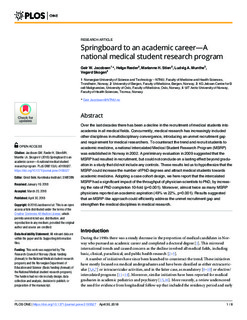Springboard to an academic career - A national medical student research program
Journal article, Peer reviewed
Published version
Permanent lenke
http://hdl.handle.net/11250/2508072Utgivelsesdato
2018Metadata
Vis full innførselSamlinger
Sammendrag
Over the last decades there has been a decline in the recruitment of medical students into academia in all medical fields. Concurrently, medical research has increasingly included other disciplines in multidisciplinary convergence, introducing an unmet recruitment gap and requirement for medical researchers. To counteract the trend and recruit students to academic medicine, a national intercalated Medical Student Research Program (MSRP) was established in Norway in 2002. A preliminary evaluation in 2009 suggested that the MSRP had resulted in recruitment, but could not conclude on a lasting effect beyond graduation in a study that did not include any controls. These results led us to hypothesize that the MSRP could increase the number of PhD degrees and attract medical students towards academic medicine. Adopting a case cohort design, we here report that the intercalated MSRP had a significant impact of the throughput of physician-scientists to PhD, by increasing the rate of PhD completion 10-fold (p<0.001). Moreover, almost twice as many MSRP physicians reported an academic aspiration (49% vs 22%, p<0.001). Results suggested that an MSRP-like approach could efficiently address the unmet recruitment gap and strengthen the medical disciplines in medical research.

